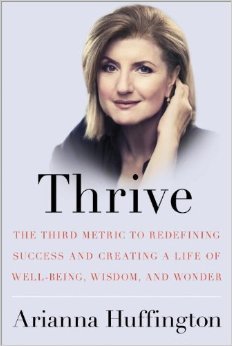We all know at least one person who played a significant role in generating considerable new revenue for their firm, was thanked at a company meeting yet didn't receive any financial acknowledgement for their work. But the top brass still gave themselves big bonuses. What most motivates each of us? Many of us seek a Third Metric way to thrive, and that involves life balance, just as motivations do. That's why I have a differing view with Daniel Pink whom I deeply admire, and Malcolm Gladwell and many researchers.
It feels vulnerable to contradict such popular experts yet my greater desire is to see if anyone else feels similarly. I am not sure what proportion of intrinsic and extrinsic motivation most nudges me to write this, yet that is part of my point.
Here's my belief. Pink suggests that intrinsic rewards having a stronger and more beneficial effect on us than extrinsic benefits. I think that there is a deeper interplay between these two drives. One where both remain vital. School grades are cited, for example, as a form of extrinsic recognition if they are viewed as a reflection of a student's ability. Yet they fall into the intrinsic bucket of motivation if they are seen as what is actually accomplished in class. Often, there's a blurry line of beliefs about what most nudges students -- or any of us -- to perform well.
Further, Santa Clara University professor Tim Urdan suggests we have divergent views about the two motivations: "The realists argue that in the 'real world' extrinsic rewards are common, expected, and needed to enhance or maintain motivation. Idealists, on the other hand, suggest that the 'real world' is merely a human construction, one that might be reconstructed to de-emphasize extrinsic rewards."
Even After Become Masterful at Something We May Still Need Money.
In some situations, I believe that our desire or need for extrinsic rewards does not dissipate as we become more inner-directed or accomplished. In fact, other elements come into play at different times and in various situations. For example, what financial and other life factors are uppermost in our minds at the time? Plus our mindset, and temperament affect our view of the situation.
From a brief excerpt in Dan Pink's upcoming book, To Sell is Human, it seems that we draw different conclusions while viewing the same work conditions. Yes, some kinds of selling (and other work) are increasingly complex today. Yet Pink believes that intrinsic reward are always more motivating and reflect the main path to higher performance than I do. He suggests that performance requires "incentives beyond a dangled carrot."
Rather than taking the "beyond" view, adopt the "both" approach, to establish the right proportion of incentives for the person and their situation at the time. That's why lattice career options are becoming increasingly popular. I also believe that smartly-managed organizations will spur high performance by providing a combination of both incentives, and that employees should be involved in choosing the mix that best suits them.
This is especially vital for businesses that require complex work, where there's a continuing war for top talent and some workers can pick and choose where they want to work. It behooves leaders to involve workers in choosing options for the design of their work, in support of what most drives each of them to perform well. Rather than worrying about what kind of motivation most drives peak performance and happy workers, focus on creating organizational systems that enable workers thrive as they work in ways that most motivate them. What better way for any organization to understand, motivate, optimize and retain their top talent?
Money and other material advantages often do matter, especially in this wobbly economy that is still dire for many people we know. College athletes on scholarship, for example, may actually have a vital need for both so those twin desires can spur rather than hinder their increased mastery.
Our choices are deeply situational. Context matters too. A lot. Here is just one example. Many are discontented with the extreme extrinsic example of company values, the increasingly wide gap between some CEOs' compensation and what most of us take home. That feeling is exacerbated when we keep hearing how the top one percent has managed to do increasingly well, with special tax breaks and special investment opportunities while many of us are experiencing flattened incomes or worse. The inherent unfairness and the uncertainty we feel about the economy, driven home by what we and/or friends are experiencing, moves money and other extrinsic rewards closer to the top of our minds.
For example, three talented friends of mine remain in their corporate jobs, despite feeling thwarted by supervisors, because they are afraid of losing the medical coverage that their spouses badly need.
Many others I know value both the opportunity to do meaningful work with people they respect, and be rewarded by recognition and salary increases and bonuses. Financial acknowledgement of one's value at work will remain closely intertwined with the chance to use one's best talents on meaningful work.
Self-aware leaders know their strengths and motivations. They are adept at modeling an "us" approach to seizing opportunities and solving problems. They are more likely to understand that, to optimize their organization's talent, they shouldn't presume to know what's best for each colleague. Just as it behooves you to encourage others' self-organizing skills in this increasingly less hierarchical and more connected world, you win when you involve those you lead in choosing the mix of what most motivates for them to perform at their peak.



